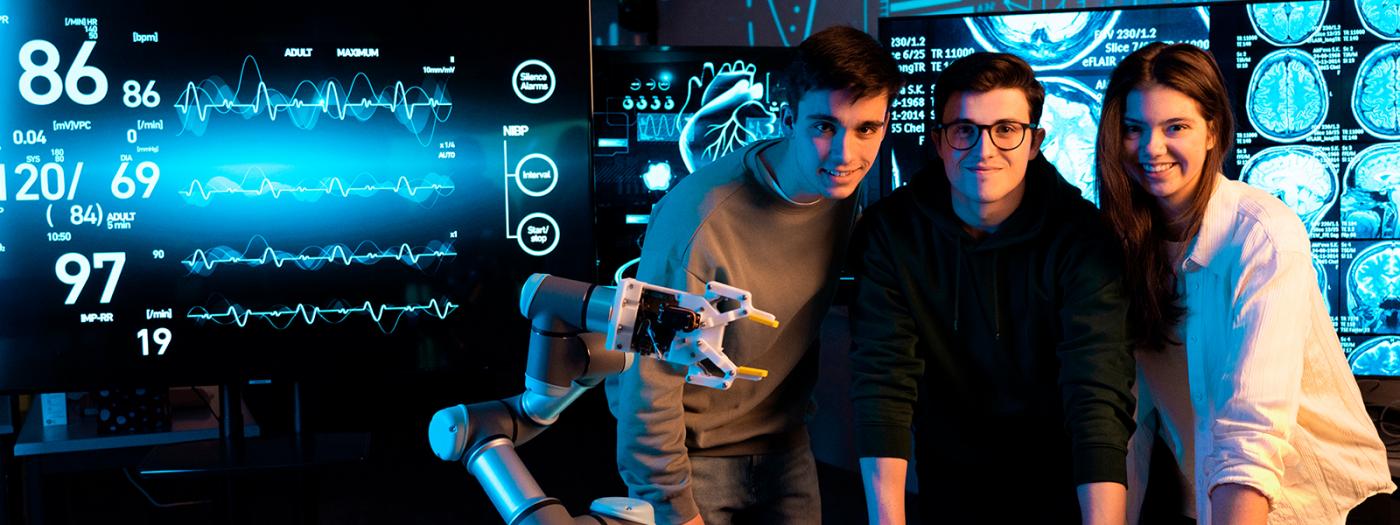This course provides important knowledge about the principles of artificial intelligence (AI) and machine learning (ML) applied to the field of healthcare engineering. Key techniques such as classification, regression, and clustering will be explored, with a focus on solving biomedical problems, such as medical image interpretation, clinical outcome prediction, and physiological signal analysis. Students will develop practical skills in implementing models using programming environments, integrating technical knowledge with the specific needs of the healthcare sector.
In addition, the ethical and regulatory challenges associated with the use of AI in healthcare settings will be analyzed, fostering a critical understanding of model reliability and interpretability. Upon completion, participants will be prepared to apply these tools to develop innovative solutions that contribute to improving disease prevention, diagnosis, and treatment, as well as optimizing healthcare management.
Titular Professors
Knowledge of linear algebra, mathematics, statistics, programming, signal processing, and medical imaging is recommended.
Students acquire the knowledge and develop the skills listed below:
1. Understand the fundamentals of AI and machine learning applied to biomedical data analysis and clinical process improvement.
2. Develop and evaluate AI models to solve specific problems in the healthcare field.
3. Apply programming tools to implement AI algorithms, using environments and libraries such as Python, TensorFlow, Keras, or Scikit-Learn.
4. Identify and address ethical and regulatory challenges related to the use of AI in healthcare settings, ensuring data privacy and security.
5. Encourage interdisciplinary work between engineering professionals and the healthcare sector, promoting innovative and evidence-based solutions.
1. Introduction to Artificial Intelligence (AI)
- Definition and applications of AI, history, evolution, and types. Differences between AI, Machine Learning (ML), and Deep Learning.
2. Machine Learning Fundamentals
- Definition of ML and its types (supervised learning, unsupervised learning, reinforcement learning). Basic concepts: models, features, overfitting and underfitting. Model evaluation and metrics. Libraries and tools in Python.
3. Supervised Learning
- Linear and logistic regression. Support vector machines (SVMs). Decision trees and random forests. Artificial neural networks (multilayer perceptrons). Practical applications.
4. Unsupervised Learning
- Clustering (K-means, DBSCAN: Density-Based Spatial Clustering of Applications with Noise, Hierarchical). Dimensionality reduction (PCA: Principal Component Analysis, t-SNE: t-Distributed Stochastic Neighbor Embedding). Generative models. Generative adversarial networks (GANs) and VAEs: Variational Autoencoders). Practical applications.
5. Deep Learning
- Introduction to deep neural networks. Architectures: Convolutional Neural Networks. Recurrent Neural Networks. Transformers. Applications in computer vision and natural language processing. Implementation with TensorFlow/PyTorch.
6. Ethics, Bias, and the Future of AI.
The course combines theoretical and practical approaches to ensure comprehensive learning, with an emphasis on the application of artificial intelligence in healthcare settings. It is structured around theoretical lectures, practical sessions, analysis and discussion of real-life AI application cases in healthcare engineering, and the development of a project where students apply the acquired knowledge to solve a specific healthcare problem.
The evaluation elements of this subject are:
Continuous Assessment
Midterm and final examinations
Projects
Periodic Continuous Assessment exercises proposed on class (10%): Exercises will be assigned in class and submitted via eStudy, either at the end of the session or by a specified deadline.
Midterm and final examinations (40%). A midterm exam (20% of the final grade) and a final exam (20% of the final grade) will be administered during the official examination periods (midterm week of the first semester and the final exam session in February). Retake opportunities for each exam will be available during the extraordinary call. A minimum grade of 4 (out of 10) is required in each exam to pass the course.
Projects (50%): Two projects will be assigned, focusing on data exploration, preprocessing, feature engineering, and prediction using a provided dataset. Projects may be completed in pairs or individually. A minimum grade of 5 (out of 10) is required on each project in order to pass the course.
Goodfellow, I., Bengio, Y., Courville, A., & Bengio, Y. (2016). Deep learning (Vol. 1, No. 2). Cambridge: MIT press.
Python 3 Documentation. Retrieved from https://docs.python.org/3/
Pandas Documentation. Retrieved from https://pandas.pydata.org/pandas-docs/stable/
Matplotlib Documentation. Retrieved from https://matplotlib.org/contents.html
Seaborn Documentation. Retrieved from https://seaborn.pydata.org/api.html
Scikit Learn Documentation. Retrieved from https://scikit-learn.org/stable/documentation.html
Keras Documentation. Retrieved from https://keras.io/
Pytorch Documentation. Retrieved from https://pytorch.org/
